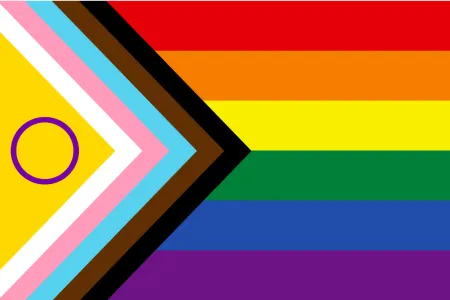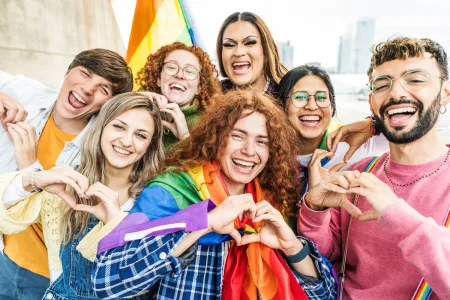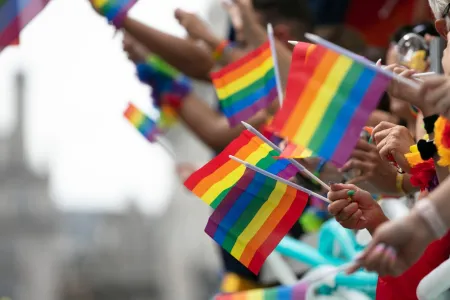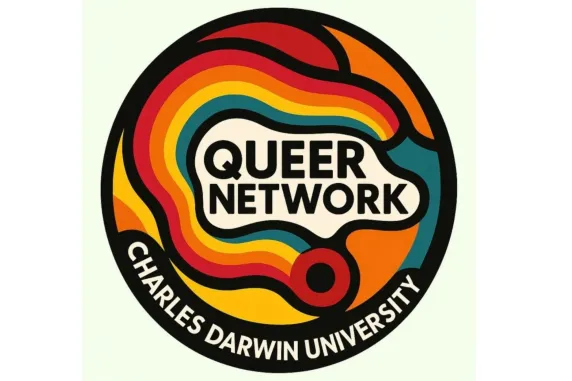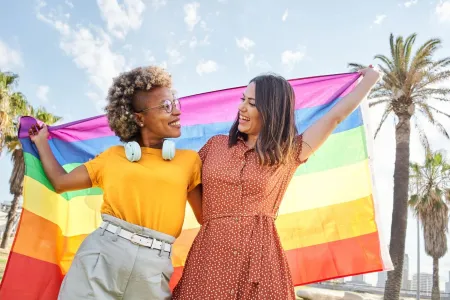At Charles Darwin University, we celebrate sexual and gender diversity and are committed to fostering safe, respectful, and supportive campuses for everyone. We welcome people of all sexualities, gender identities, and expressions, including those who identify as or are questioning being lesbian, gay, bisexual, transgender/gender diverse, queer, intersex, and asexual (LGBTQIA+).
We recognise that each person’s experience is shaped by the intersection of their identities including race, culture, ability, religion, and socio-economic background, and we are committed to creating an environment where these intersecting identities are respected and valued.
CDU maintains a zero-tolerance approach to homophobia, biphobia, transphobia, and intersexphobia, and we are actively working to ensure equity, dignity, and safety for all.
Understanding LBGTQIA+ terminology
LGBTQIA+ is an abbreviation for Lesbian, Gay, Bisexual, Trans and Gender Diverse, Queer or Questioning, Intersex, and Asexual.
At CDU, we also acknowledge and respect a broader range of identities, including Allies, Pansexual, and Androgynous, which may not appear in the acronym but are equally valid and welcome in our community.
Language within the LGBTQIA+ community is constantly evolving and can vary between individuals, cultures, and generations. People may use different terms to describe their identity, and these terms can change over time based on personal experiences or changing social understanding.
LGBTQIA+ identities explained
| L: | A lesbian woman is romantically and/or sexually attracted to other women. |
| G: | A gay person is romantically and/or sexually attracted to people of the same sex and/ or gender as themselves. This term is often used to describe men who are attracted to other men, but some women and gender diverse people may describe themselves as gay. |
| B: | A bisexual person is romantically and/or sexually attracted to people of their own gender and other genders. |
| T: | A trans (short for transgender) person is someone whose gender does not exclusively align with the one they were assigned at birth. |
| Q: | The “Q” in LGBTQIA+ is used here as “Queer and questioning”. Rather than be locked into a certainty, some people are still exploring or questioning their gender or sexual orientation. People may not wish to have one of the other labels applied to them in specific contexts or at particular times, for a variety of reasons, but may still wish to be clear, for example, that they are non-binary or non-heterosexual. It is important these individuals feel welcome and included in the acronym and community spaces. |
| I: | Intersex refers to people who are born with physical sex characteristics such as genitals, reproductive organs, or chromosomes that don’t fit typical definitions of male or female bodies. Intersex people are usually assigned a male or female sex at birth, but this may not reflect their identity or lived experience. |
| A: | An asexual person does not experience sexual attraction but may experience romantic attraction towards others. |
| + | The ‘plus’ is used to signify all of the gender identities and sexual orientations that letters and words cannot yet fully describe. |
CDU Inclusive Language Guide for LGBTQIA+
The LGBTQIA+ inclusive language guide for Charles Darwin University (CDU) explains how to use language respectfully and inclusively when working with and referring to LGBTQIA+ people.
By using inclusive language, we demonstrate respect in both our workplaces and in developing and delivering policies, programs and services for all staff and students.
This guide seeks to give you an understanding of some of the key concepts and common terms for LGBTQIA+ people. It also gives you practical guidance on making inclusive language part of your work at CDU.
Training
As members of Pride in Diversity, CDU has access to a terrific suite of LGBTQIA+ training materials.
Foundations of LGBTQ Inclusion eLearn module
Learn key LGBTQIA+ terms, why inclusion matters, real-world challenges people face, and how you can help create a more inclusive environment.
To request access to this training, please email diversity@cdu.edu.au and you will be provided with CDU login details.
A series of bite-sized videos talking about different identities/experiences of LGBTQIA+ people, including intersectionality.
To request access to this training, please email diversity@cdu.edu.au and you will be provided with CDU login details.
A simple way to be an LGBTQIA+ ally
In his TEDx talk, trans student Keegan Thoranin shares how active listening can be a powerful first step to becoming an LGBTQ+ ally, encouraging greater empathy, connection, and respect for the diversity in our communities.
The Spectrum of Gender Identity in the Workplace
Explore the evolving concept of gender and learn how to create a more inclusive workplace where everyone feels seen, respected, and valued, no matter how a person identifies.
A short history of trans people’s long fight for equality
In this TED talk, Trans activist Samy Nour Younes highlights the long, courageous history of the trans community and urges us to rethink the conversation by recognising their centuries-long fight for equality and civil rights.
Pride @ CDU
Pride@CDU is a closed group for CDU students and staff who identify as LGBTQIA+ and/or are allies. It’s a safe and welcoming (virtual) space for people to connect, share stories, support each other and organise campaigns about issues that matter.
If you would like to join Pride@CDU, complete the Pride Network form.
CDU Queer Network
Queer Network is a student-led group dedicated to creating a safe, welcoming space where LGBTQIA+ students can connect, feel supported, and celebrate queer identity and culture together. Whether you’re looking to make new friends, get involved in events, or help shape a more inclusive CDU, the Queer Network is here for you.
The Queer Network will be recognising and celebrating key dates that matter to the LGBTQIA+ community, raising awareness, and building a strong sense of belonging for queer students across the University.
If you are interested in joining the Queer Network or would like to learn more, visit the CDU Queer Network page.
CDU Ally Network
The CDU Ally Network is comprised of more than 100 CDU staff members who, through attending ongoing professional development, are aware of the issues faced by members of the LGBTQIA+ community. An Ally is an active agent of change who chooses to challenge anti-LGBTIQIA+ prejudice and heteronormative values.
Allies are not experts on sexuality and gender identity, but continue to develop their knowledge of these matters.
A CDU Ally can offer you:
- a safe place to talk
- an open and accepting attitude
- an opportunity to be listened to and understood
- confidentiality
- a wide variety of referral avenues, both on and off campus.
If you wish to speak to a CDU Ally or learn more about the network, please reach out to the Diversity and Inclusion team at pride@cdu.edu.au or look for any staff member wearing a rainbow pin on campus.
Gender neutral bathrooms at CDU
At all CDU campuses, accessible toilets also serve as gender-neutral toilets.
This dual purpose is intentional and designed to support privacy, safety, and dignity for all users including transgender and gender diverse individuals, and anyone who may prefer or require a private facility.
By using accessible toilets as gender-neutral spaces, CDU helps ensure that staff, students, and visitors can access bathroom facilities without being forced to disclose or defend their gender identity.
CDU continues to explore further inclusive infrastructure options as part of our ongoing commitment to diversity, access, and wellbeing.
Using chosen names at CDU
At CDU, we are committed to providing a safe, supportive, and inclusive environment for students, staff, and visitors. We recognise that students and staff may use names other than their legal names to identify themselves.
People have many reasons for using a chosen name rather than their legally recognised name. A chosen name might better reflect someone’s gender identity, their cultural and/or social identity. To learn more about this, please visit the Chosen name webpage.
If you are a student seeking to update or edit your chosen name, visit MyStudentInfo.
Policies to ensure your wellbeing
CDU has a range of policies and procedures in place to support the wellbeing of both staff and students. You can explore these below.
Support at CDU
CDU celebrates sexual and gender diversity, and we pride ourselves on maintaining safe and supportive campuses, where people who identify as (or are questioning being) lesbian, gay, bisexual, transgender/gender diverse, queer, intersex and asexual (LGBTQIA+) can work and study free from sexual discrimination, bigotry or prejudice.
We have a zero-tolerance approach to homophobia, biphobia, transphobia and intersexphobia.
If you identify as LGBTQIA+ and are seeking support, advice, or just someone to talk to, there are several confidential and affirming options available.
Staff support
CDU Diversity and Inclusion Team: Please email pride@cdu.edu.au for a confidential and respectful conversation.
Employee Assistance Program (EAP): Provides access to free, confidential, short-term counselling services for all University staff and their immediate **family members. The University uses a number of providers for the provision of this service. You can access support through them on the details provided on the Waterhole.
Student support
Safer Communities: Students can connect with a dedicated CDU Safer Communities Specialist by emailing safercommunities@cdu.edu.au.
CDU Counselling: Free and confidential counselling is available to all students. Our professional counsellors are experienced in supporting LGBTQIA+ students in a safe and affirming space. You can request a session with a CDU Counsellor by submitting a counselling session booking request.

